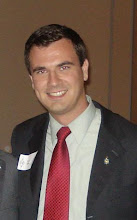 If you really want to get a spirited discussion going, take a group of friends out to a “new music” concert and then ask them what they thought afterwards. By its very nature, modern (or should I say postmodern?) music is supposed to get very different reactions from different people, so you are bound to get a good conversation going. Just like modern visual art, you’re bound to hear a lot of “my kid could have done that,” “I wish they paid me to do that!” and my favorite “how is that art/music?” (My personal answers to which are, respectively “But he/she didn’t”, “I’m sure you do”, and “that’s a good question, what do you think?”)
If you really want to get a spirited discussion going, take a group of friends out to a “new music” concert and then ask them what they thought afterwards. By its very nature, modern (or should I say postmodern?) music is supposed to get very different reactions from different people, so you are bound to get a good conversation going. Just like modern visual art, you’re bound to hear a lot of “my kid could have done that,” “I wish they paid me to do that!” and my favorite “how is that art/music?” (My personal answers to which are, respectively “But he/she didn’t”, “I’m sure you do”, and “that’s a good question, what do you think?”)The entire 20th century, and the bit of the 21st century that we have experienced have been about radically changing the direction of art and music. Unfortunately, when many people listen to contemporary music, they are doing so from a very outdated perspective. The argument can definitely be made that during certain artistic eras, the purpose of music was to tell a story, augment a dance or visual scene, or maybe just to be a beautiful distraction from ordinary life. This, however, is not always the case for modern and contemporary music. Much music from the 20th and 21st century was composed to make the listener think, and ironically, when you are arguing over it after the concert, it is doing just that. If you hear a car horn out on the street, you probably think very little of it, but if you hear it in the middle of a symphony, you are likely to have some sort of reaction – you’ll think about it. Getting the audience to say “Why on earth did that composer put a car horn here?” very well could be the reason that the composer put a car horn there.
 A few years back I heard a cell phone ring at a concert and thought to myself that it was only a matter of time before some composer wrote a piece to be performed on cell phones. It isn’t exactly what I had in mind, but here is an example of just that. I can’t say that I like this piece aesthetically, but I’m pretty sure I’m not supposed to. By presenting music in this form, the composer is asking us to think about technology and art, the place of cell phones in our lives (should they be used to make music?) and, I think, asking the audience to mull over the definition of music (is this piece music, or is noise, is it both?) I got a laugh out of some of the comments, both because they were funny, and also because I’m willing to bet this piece was written to get a reaction, so the critics posting are really just giving the artist what he or she wanted.
A few years back I heard a cell phone ring at a concert and thought to myself that it was only a matter of time before some composer wrote a piece to be performed on cell phones. It isn’t exactly what I had in mind, but here is an example of just that. I can’t say that I like this piece aesthetically, but I’m pretty sure I’m not supposed to. By presenting music in this form, the composer is asking us to think about technology and art, the place of cell phones in our lives (should they be used to make music?) and, I think, asking the audience to mull over the definition of music (is this piece music, or is noise, is it both?) I got a laugh out of some of the comments, both because they were funny, and also because I’m willing to bet this piece was written to get a reaction, so the critics posting are really just giving the artist what he or she wanted.Our eyes and ears should always be open for “new” music. John Cage (whose work is pictured to the above left - how would you play that, exactly?) would argue it’s all around us. On March 18th through 21st, the Baltimore Symphony Orchestra will be performing Corigliano’s Circus Maximus, a very unique and modern piece that I have heard about and am very much looking forward to. I’m also looking forward to the discussion that will undoubtedly take place afterwards.












